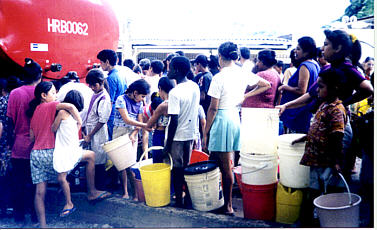General Board of Global
Ministries
![]()
UM Information
![]()
UM Reporter
![]()
Employment
![]()
Archives
![]()
Favorite Places
![]()
![]() Florida Southern College
Florida Southern College
![]()
![]() Bethune Cookman College
Bethune Cookman College
![]()
![]() FL
UM Children's Home
FL
UM Children's Home
![]()
|
|
Florida Conference responds to Mitch survivors |
|
Residents of Togucigalpa line up to receive water from a truck in the Honduran capitol. Dirty water, standing mud and lack of medical care are contributing to serious health problems, said Dr. joe Dorn, a physician and member of FIrst UMC, Inverness, who traveled to Honduras last November to offer medical care to Hurricane Mitch survivors. |
| By Michael Wacht LAKELAND — “Life [in Honduras] is coming to normal, little by
little, but the need is great,” said Bishop Armando Rodriguez, the retired Cuban
bishop who is serving the Methodist Church in Honduras. He says the Florida Conference has
helped make that possible through the medicine, supplies, money and people it has sent to
the country after last October’s Hurricane Mitch killed thousands and left millions
homeless.
Dr. Joe Dorn, a family physician at Citrus Memorial Hospital and member of First United Methodist Church, Inverness, was one of the first Floridians to respond. He went to Honduras last Thanksgiving Day with a team from his church to provide medical services. His son, Aaron, and Ryan Conrad, a classmate at Citrus High School, also went. Dorn said he found a lot of illness among the Honduran people, many of whom were “medically under-served” before Hurricane Mitch. Now, the dirty water, lack of food and shelter, and increasingly inadequate care have worsened the situation. He reported treating many cases of fungal skin infections, intestinal parasites and respiratory problems. Despite those circumstances, coupled with an infrastructure that is still heavily damaged and severe transportation problems, Dorn said “the spirit of the people was tremendous.” “They were very helpful and very open-armed,” he said, “greeting us everywhere we went.” The conference itself has also been a significant responder to the needs of Honduran survivors through donations to United Methodist Committee on Relief (UMCOR), according to Wendy Whiteside, UMCOR’s executive secretary for program management. “In 1998, Florida has had everything but locusts. When you have an area that’s experienced crisis, the area responds comparably back when someone else is in crisis,” she said. UMCOR has already received well over $400,000 in donations for relief in Honduras, but because of the year-end rush of donations, Whiteside said it is difficult to say how much has come from any individual conference. In addition to the money and relief supplies given through UMCOR, several Florida Conference churches and ministries have acted on their own to help the Honduran people. Eugene Rodriguez, president of the conference’s Hispanic Committee on Ministries, said Florida’s 18 Hispanic United Methodist churches and 10 Hispanic missions shipped a generator and enough canned food, clothing, blankets, medicines and lamps to fill a 40-foot shipping container. Although the value of the shipment was approximately $40,000, Rodriguez said it has only scratched the surface. As one of the poorest countries in this hemisphere, he said Honduras needed “all that stuff before the hurricane.” The supplies were stored at a warehouse and shipped free of charge by World-wide Air Marine in Miami, a shipping company owned by Mario Rodriguez, a member of Hispanic American United Methodist Church in Hialeah. The Hispanic Committee also sent $2,000 worth of medicine and is collecting money Bishop Rodriguez can use to start rebuilding structures and lives. He says they will buy building supplies locally and hire local workers, which will improve an “economic situation that was greatly aggravated by the hurricane.” Dorn says that in the big picture, his efforts did not accomplish very much, but in the minds of the people he helped, his services were something they had never received before. He said, “It showed them that somebody cared.” Top
of this page |

